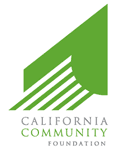California Community Foundation
This article has multiple issues. Please help improve it or discuss these issues on the talk page. (Learn how and when to remove these messages)
|
 | |
| Location | |
|---|---|
Area served | Los Angeles County Worldwide |
| Method | Donations and Grants |
Key people | Antonia Hernández President & CEO Hon. Gloria Molina Board of Directors Chair James E. Berliner Board of Directors Chair Emeritus |
| Endowment | US$1.9 Billion in Assets(2020) |
| Website | www.calfund.org |
The California Community Foundation (CCF) is a philanthropic organization located in Los Angeles, California. Foundation Center, an independent nonprofit organization, ranks it among the top 100 foundations in the nation by asset size and total giving. Among all community foundations, CCF is 5th by total giving and 7th by asset size, as of the fiscal year that ended 6/30/12.[1][2]
Mission statement
[edit]CCF states it is dedicated to strengthening communities of Los Angeles County through philanthropy and civic engagement. It fulfills its mission through fundraising, charitable fund management, grantmaking, and meetings with donors, financial advisors, local nonprofits and foundation partners. It also serves as an advocate for the vulnerable and poor.[3][4]
History
[edit]The CCF was founded in 1915 by Joseph Sartori. For 65 years, the foundation made grants mostly for equipment and capital.[5][6]
Program areas
[edit]CCF provides grants and other support to a range of local nonprofits with an emphasis on helping vulnerable populations and strengthening communities of L.A. County in five areas.[7]
The Arts Program aims to strengthen the cultural vitality of L.A. County by increasing the operational capacity of small and mid-size arts and cultural organizations, increasing arts opportunities that are affordable and accessible to underserved communities, and improving participation in the arts by diverse, low-income residents and professional artists.[8]
The Education Program focuses on improving school readiness and K-5 student performance in reading and math while supporting partnerships among schools, districts, teachers and parents that demonstrate a commitment to this goal.[9][10]
The Health Care Program seeks to improve access to regular, sustainable and affordable sources of quality health care for low-income adults and children, with a focus on community clinics and uninsured individuals.
The Housing and Neighborhoods Program concentrates on increasing access to affordable housing and efforts that emphasize multiservice, geographically focused approaches to improve the conditions of underserved neighborhoods. In conjunction with this program, the Community Foundation Land Trust of CCF buys land, works with private and public partners that obtain financing and approvals to build, and then ensures that they remain affordable homes for decades to come.
Foundation grants are also made on a limited basis to nonprofits for adults with developmental disabilities, aging adults, animal welfare, disaster relief, and transitional-age foster youth. Donor advised grants comprise the majority of annual grantmaking by CCF and may be directed to worthwhile causes and qualified organizations anywhere in the world.
Civic engagement
[edit]CCF believes the actions of ordinary people can affect the outcomes of larger issues in their lives through collective engagement and shared problem-solving, and therefore advocates and invests in civic engagement activities that foster social change. These activities include:[11][12][13]
Immigrant Integration A concentrated effort through local nonprofits with cultural competence to integrate newcomers into the social, civic and economic fabric of life in L.A. County.
Los Angeles Citizenship Collaboration An initiative to encourage and assist eligible Legal Permanent residents to become U.S. citizens, in partnership with members of the nonprofit, public and private sectors and local funders.
Los Angeles Preschool Advocacy Initiative A multi-year effort since 2007 with the David and Lucille Packard Foundation to increase access to quality early care and education for underserved communities and to support efforts that address the child care and development needs of children, ages 0–5.
See also
[edit]References
[edit]- ^ "Foundation Stats: Guide to the Foundation Center's Research Database - Foundation Center". foundationcenter.org. Retrieved 16 May 2018.
- ^ "California Community Foundation - GuideStar Profile".
- ^ "ABOUT L.A. COUNTY". California Community Foundation. Archived from the original on 10 December 2013. Retrieved 16 May 2018.
- ^ "California Community Foundation - National Committee For Responsive Philanthropy". ncrp.org. Retrieved 16 May 2018.
- ^ "CCF HISTORY". California Community Foundation. Archived from the original on 11 December 2013. Retrieved 16 May 2018.
- ^ "The 2006 Slate 60: Donations". 15 February 2007. Retrieved 16 May 2018 – via Slate.
- ^ "CCF CORE PROGRAM AREAS". California Community Foundation. Archived from the original on 10 December 2013. Retrieved 16 May 2018.
- ^ Muchnic, Suzanne (15 June 2007). "15 local visual artists will be named fellows". Retrieved 16 May 2018 – via LA Times.
- ^ OAKES, AMY (20 November 1997). "5 Schools to Divide $200,000 Gift Equally for Book Purchases". Retrieved 16 May 2018 – via LA Times.
- ^ Watanabe, Teresa (19 July 2012). "School programs in L.A. to get $1.7 million in grants". Retrieved 16 May 2018 – via LA Times.
- ^ "Civic Engagement". California Community Foundation. Archived from the original on 11 December 2013. Retrieved 16 May 2018.
- ^ Watanabe, Teresa (10 February 2009). "Foundation aims to help L.A. immigrants". Retrieved 16 May 2018 – via LA Times.
- ^ "Initiatives". California Community Foundation. Archived from the original on 11 December 2013. Retrieved 16 May 2018.
